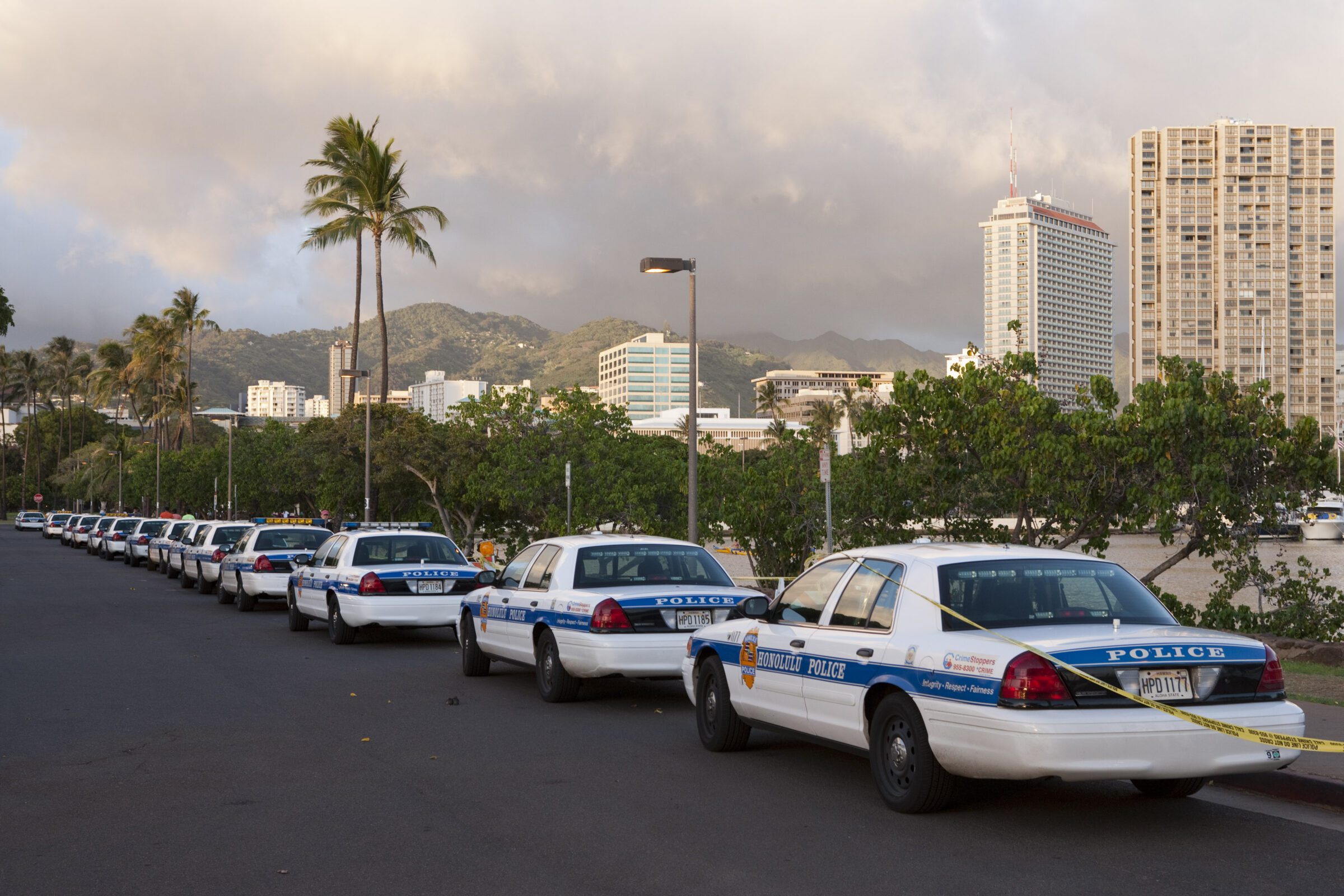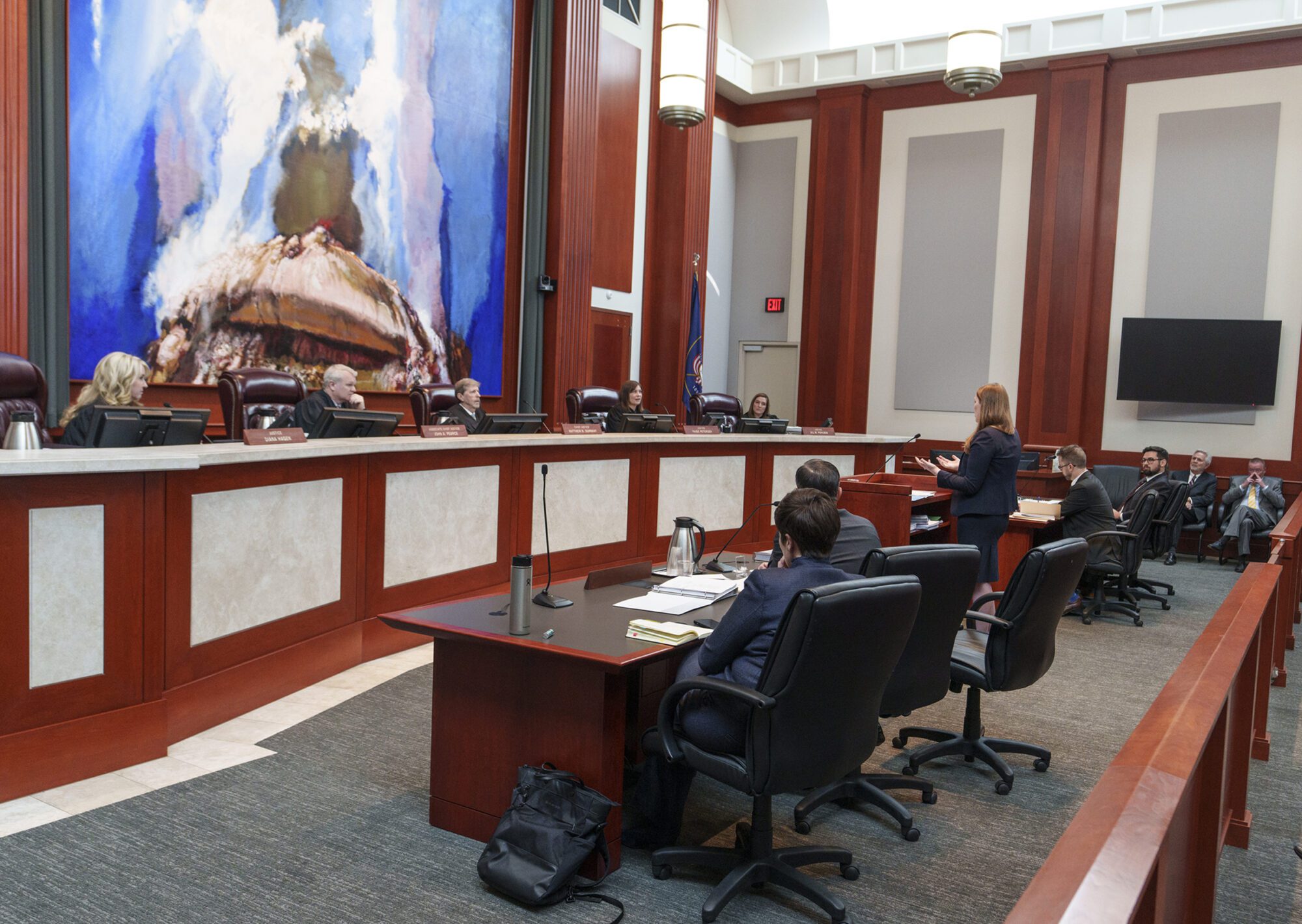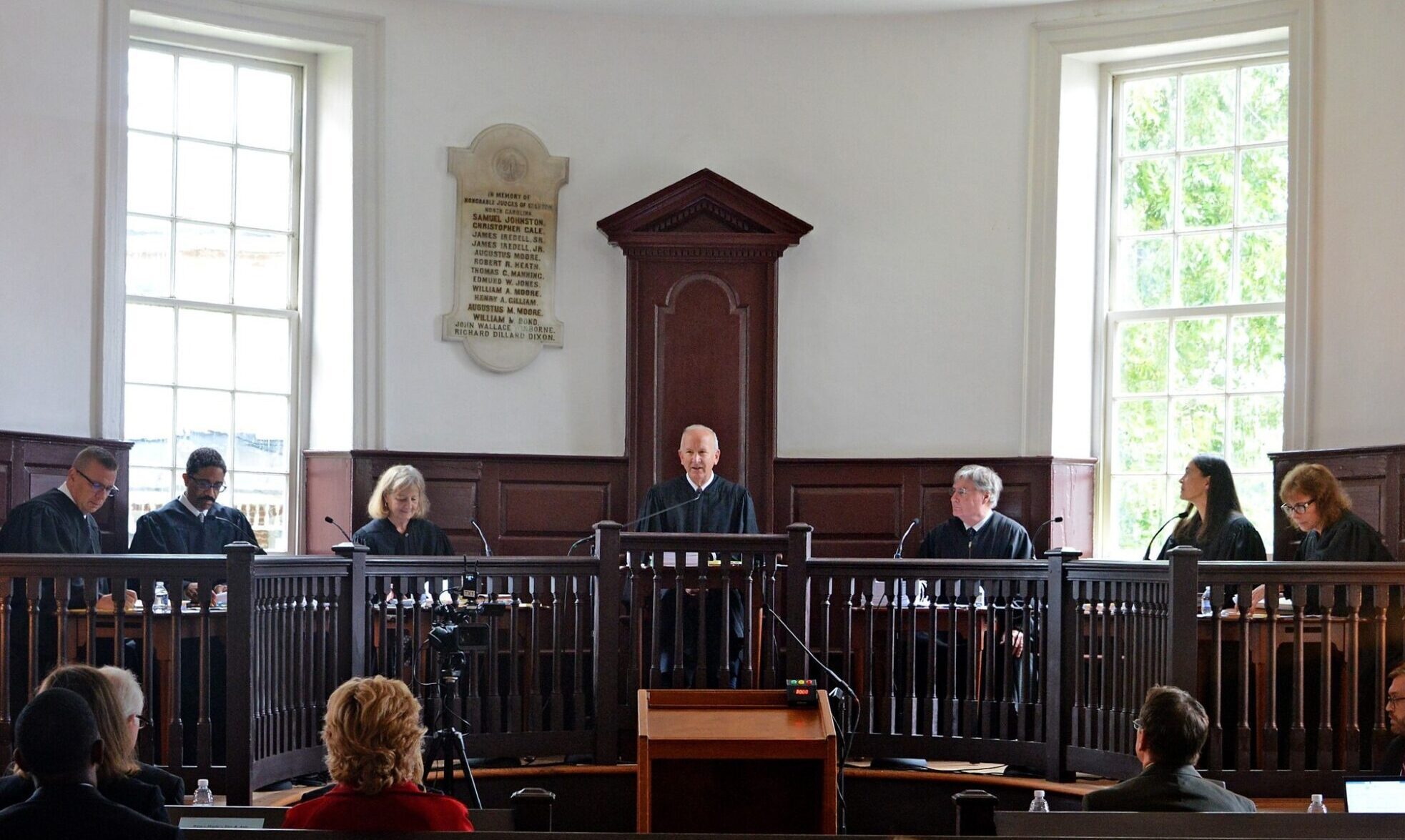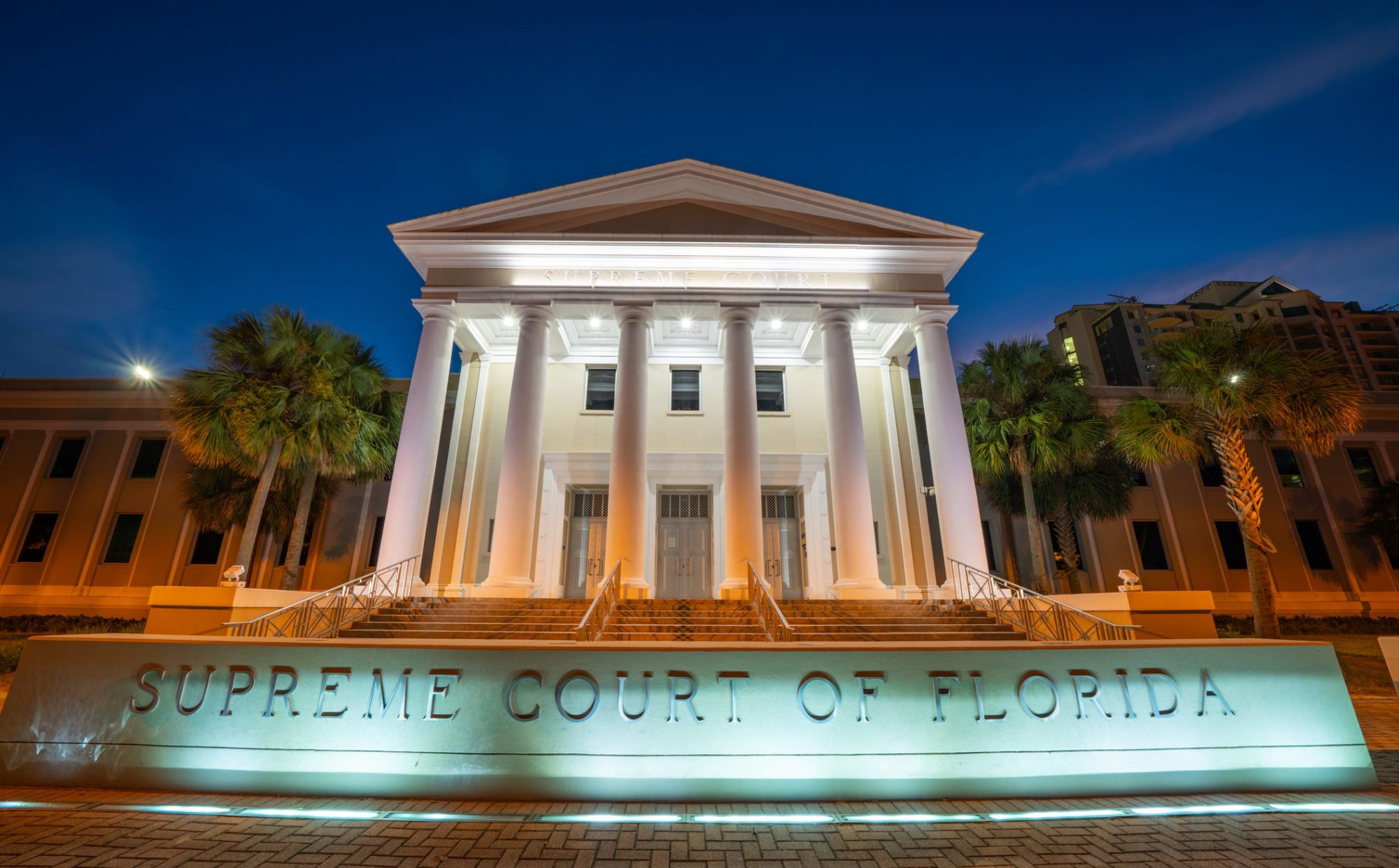Hawaii Supreme Court Expands Rights of Defendants, and Once Again Rebukes SCOTUS
The justices ruled that Hawaii’s constitution requires police to record interrogations. And they vowed to protect due process for Hawaii residents—unlike, they said, the Roberts Court.
| September 25, 2025

Do you want to learn about state supreme courts? Check out our explainer to how they work, and why they matter, and our 50-state guide on how each high court functions. Plus, sign up for our newsletter.
Charles Zuffante was a passenger in his girlfriend’s car, driving on Hawaii’s Big Island in late 2021, when the police stopped them for expired registration. During the traffic stop, police saw a glass pipe and arrested both Zuffante and his girlfriend. They found 3.5 grams of methamphetamine in his pants pocket; when they searched the car, which belonged to her, they found 130 grams stored in different spots.
At trial, a police officer testified that Zuffante had confessed to him that “everything” belonged to him and that “all the meth was his,” prompting Zuffante to interject and accuse the detective of lying; he took the stand to insist that he didn’t know what was in the car and that he’d never said otherwise during the interrogation.
Zuffante had assumed the interrogation was recorded because of a camera in the room, but it wasn’t. The officer had taken no written notes during the interrogation, only filing a report a week later. With just Zuffante’s word against the officer’s, he was convicted of several charges, including “promoting a dangerous drug in the first degree,” a very serious offense that would have been far harder for prosecutors to prove absent the purported confession. Zuffante was sentenced to twenty years in prison.
Zuffante appealed the decision, insisting his rights had been violated and that the absence of a recording left him no choice but to take the stand. The Hawaii Supreme Court sided with him last week in a significant win for the rights of criminal defendants, holding that police have a constitutional obligation to record interrogations.
The ruling means that law enforcement in the state will now be required to record all interrogations taking place inside police stations. It also requires police to record them outside stations “when feasible.”
Wookie Kim, legal director of the ACLU of Hawaii, which filed an amicus brief in the case, told Bolts that the court’s decision “ensures fundamental fairness and integrity in the criminal legal system, and more specifically it ensures that people aren’t wrongfully convicted because of inaccurate or misleading testimony by officers about what happened in an interrogation room or during an interrogation.”
Across the country, 31 states already have some requirements that police record interrogations, according to a review conducted by Duke Law School, though many only require recordings for some types of cases, such as homicides. Hawaii is the ninth state to impose this requirement regardless of the crime someone is suspected of.
The court ruled that, in failing to record Zuffante’s interrogation, police had violated his right to “due process,” words that are embedded in the 5th and 14th Amendments of the U.S. Constitution.
But the court didn’t rely on the U.S. Constitution in arriving at its decision—instead, it relied exclusively on the Hawaii Constitution, which contains similar language.
Justice Todd Eddins, who authored the majority opinion, took pains to spell out that this was intentional, writing, “No United States Supreme Court opinion has tackled the recording of custodial interrogations. If a case did though, we would still look to our state constitution first.”
His opinion takes direct shots at the current conservative majority on the U.S. Supreme Court, pitting its jurisprudence against the guarantees the state constitution can provide.
The Hawaii Constitution’s due process clause “offers safety to Hawaii’s people that exceeds the federal constitution’s suddenly fluid protections,” Eddins writes.
Sign up for our updates on important legal news from states
He makes no mystery of the sort of cases he has in mind, describing the U.S. Supreme Court’s decision in Dobbs, which overturned the constitutional right to an abortion in 2022, as “erasing a generations-long constitutional right, stripping autonomy from half the population, and empowering states to force birth.”
The court’s decision comes at a time when many progressive advocates and scholars are focusing on state constitutions and state courts, given the escalating hostility of federal courts to civil rights litigation.
“In this day and age where federal constitutional rights are being eviscerated or evaporated, it’s important that state supreme courts protect people’s rights, relying on the state constitution, and this is an example of that,” Kim said.
Hawaii’s approach is by no means universal: Many state supreme courts prefer not to independently develop the meaning of their state constitutions’ rights and liberties. Instead, they’ve either imported federal courts’ interpretations of the U.S. Constitution (a process that is generally known as “lockstepping”) or declined to explain what their state constitution means.
“Some courts just want to follow federal law, instead of interpreting provisions [in their state’s constitution] within the unique context and circumstances of that state and that state’s history,” Kim said.
Hawaii has long taken a different path, however. In the 1990s, the court was the first one to suggest that the state’s statutory ban on gay marriage might be unlawful under the state constitution. In the past decade, the court has offered broad interpretations of the state constitution’s environmental rights provision broadly—for instance, a 2023 ruling required the state’s public utility commission to consider greenhouse gas emissions in approving proposed power plants.
Since joining the court in late 2020, Eddins has embraced that legacy wholeheartedly. Earlier this month, when the Hawaii Supreme Court said the state couldn’t force a plot of land to be used for religious purposes because that violated the state constitution’s “Establishment Clause,” Eddins penned a concurrence to denounce “the Roberts Court” for eroding the separation between Church and State at the federal level.
“As the people of Hawaiʻi who ratified our state constitution over the years understood, the promise of religious pluralism and secular government depends on a durable wall separating church and state,” he said. “The Roberts Court casually dismisses the lessons of American and world history, the warnings of prominent early Americans, and the judiciary’s storied legal minds. Bad things happen unless government and religion are completely separated.”
Eddins ended his opinion saying, “State constitutionalism makes it easy to consider Roberts Court jurisprudence white noise.”
Eddins drew national attention, and conservative criticism, last year with another decision he authored that upheld a ban on carrying a loaded pistol. In that case, his opinion directly rebuked the U.S. Supreme Court’s approach to the Second Amendment. “The spirit of Aloha clashes with a federally-mandated lifestyle that lets citizens walk around with deadly weapons during day-to-day activities,” Eddins wrote.
He pointed to the history of Hawaii to explain that claim but also said there was no need to ground judicial decisions on history, rejecting the ‘originalist’ approach prized by the conservatives on the U.S. Supreme Court. “History, though not the end all, is useful,” he wrote. “But unlike the United States Supreme Court, we do not subscribe to an interpretive theory that nothing else matters.”
In last week’s decision on Zuffante’s case and police interrogations, Eddins again made it clear that he was looking for alternatives to originalism.
“A constitution adapts,” he wrote. “Due process is agile… Due process matures with technological developments to protect constitutional rights.”
Two of Eddins’ colleagues on this five-member court, Sabrina McKenna and Vladimir Devens, joined his opinion. Devens is a former police officer who worked in the Honolulu Police Department.

Justice Lisa Ginoza dissented, arguing that recording interrogations “is not a matter of constitutional dimension.” She criticized the majority for requiring recordings “without actual information about the ability of law enforcement to meet the majority’s new mandates.”
She called for “input from key stakeholders—including law enforcement, the attorney general, prosecutors, the public defender, and others—because there is too much this court does not know about the on-the-ground ability and resources to effectuate this new rule.” (The court’s fifth member, Chief Justice Mark Recktenwald, split the difference, agreeing with the majority in part while also filing a partial dissent.)
The majority rejected Ginoza’s contention that the new requirement poses too high a technological burden on the police.
“[A]ny administrative or operational burden is slight compared to the constitutional stakes that arise from custodial interrogation,” Eddins wrote. “If children can record everyday events with ease, law enforcement cannot claim hardship to record perhaps its most consequential investigative act.”
Separately, the majority made the point that recordings are crucial to protect a suspect’s right to confront witnesses and their right against self-incrimination. Defendants cannot be forced to take the stand to testify at their trial, but if there’s no recording, Eddins wrote, they face an “illusory choice—either remain silent and let decisive evidence go unchallenged, or testify to refute the testimony.”
Ben Lowenthal, a criminal defense attorney and former public defender in Hawaii, told Bolts that this pressure for defendants to take the stand puts them in “a very difficult place.” Deciding whether to testify in a trial should be about “the merit of a case,” he said. “It shouldn’t be compounded by the additional problem of overcoming a credibility contest with a police officer.”
Even when the defendant chooses to testify, Lowenthal says it’s often a losing battle, telling Bolts, “In my experience, jurors want to believe what the police say, and it’s a very difficult place to get the jurors into a headspace where you consider the possibility that a police officer has not been truthful.”
The state supreme court’s decision vacated Zuffante’s conviction and remanded his case to a lower court. If the prosecution pursues a new trial, it wouldn’t be able to bring in the officer’s statements regarding Zuffante’s interrogation.
In recent years, Hawaii’s supreme court has repeatedly strengthened people’s rights in police interrogations. In 2019, it banned the police from lying about the results of a polygraph test during an interrogation because it may “coerce a suspect into making a confession.” The following year, the court broadened its prohibition on police officers lying to a suspect about the evidence against them.
The court has undergone major transitions recently, with two justices—Devens and Ginoza—only joining the court in 2024, selected by Governor Josh Green, a Democrat. Lowenthal, who has worked on appellate-level litigation in Hawaii, says their arrival “got everybody wondering where the court was going to go, whether it would change the dynamic of the court,” which historically has sided with the rights of defendants in many cases, and he thinks the picture so far is mixed on how the new justices might have shifted the court. He has been watching the court’s most recent string of cases, which include several unanimous rulings that sided with law enforcement, in addition to the case on interrogations.
The court is set for another major change soon. Recktenwald, the chief justice who tends to lean to the right of this court, is hitting the mandatory retirement age of 70 and departing this month. Green, the Democratic governor, will choose his successor based on a short list forwarded to him by the state’s judicial commission.
However the court shifts, the ACLU’s Kim hopes that Hawaii justices will continue turning toward their state constitution to protect people’s rights. Reflecting on last week’s opinion, he told Bolts, “There are many state supreme courts where you would never see a decision like this, in terms of tone, outcome, and methodology.”
Sign up and stay up-to-date
Support us
Bolts is a non-profit newsroom that relies on donations, and it takes resources to produce this work. If you appreciate our value, become a monthly donor or make a contribution.




